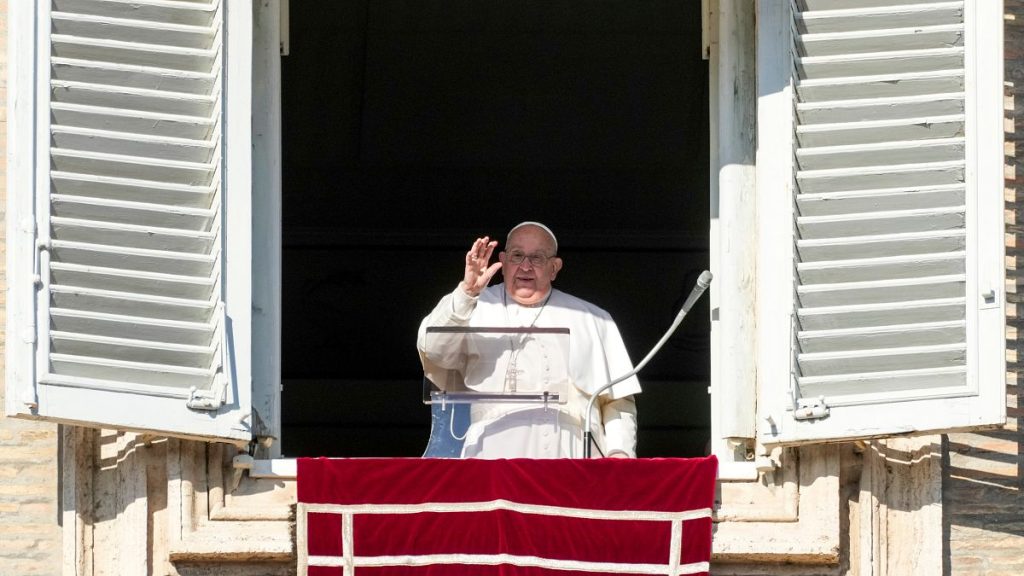Paragraph 1: Papal Condolences and Prayers for Global Peace
On a somber Sunday, Pope Francis extended his heartfelt condolences to the grieving families in South Korea who suffered the devastating loss of loved ones in a tragic plane crash that claimed the lives of 179 people. His message of sympathy, delivered at the conclusion of the Angelus prayer in St. Peter’s Square, resonated with the assembled faithful and underscored the universality of human suffering. Beyond the immediate tragedy, the Pope’s prayers encompassed a broader spectrum of global anguish, acknowledging the ongoing conflicts and humanitarian crises afflicting nations like Ukraine, Palestine, Israel, Myanmar, Sudan, and the North Kivu region of the Democratic Republic of Congo. His words served as a solemn reminder of the interconnectedness of human experience and the importance of solidarity in the face of adversity.
Paragraph 2: A Restored Papal Presence and Symbolic Rituals
The presence of Pope Francis at the window of the Apostolic Palace, delivering the Angelus prayer, marked a welcome return after his absence the previous Sunday due to a persistent cold. The large crowds gathered in St. Peter’s Square welcomed his reappearance, signifying a sense of continuity and reassurance amidst global uncertainties. Simultaneously, a significant ritual unfolded with the opening of the Holy Door of the Basilica of St. John Lateran by Cardinal Baldassare Reina, the Pope’s Vicar General. This ceremonial act held deep symbolic meaning, representing the third Holy Door opened in anticipation of the 2025 Jubilee of Hope year, a significant event in the Catholic liturgical calendar.
Paragraph 3: The Jubilee of Hope: A Beacon of Renewal and Reconciliation
The opening of the Holy Doors constitutes a pivotal moment, inaugurating the Jubilee of Hope, a momentous occasion celebrated by the Catholic Church every quarter-century. This year’s Jubilee carries the theme of "Pilgrims of Hope," encapsulating the aspirations of renewal, reconciliation, and spiritual growth for millions of believers worldwide. The first Holy Door was opened on Christmas Eve at St. Peter’s Basilica, the symbolic heart of the Catholic Church, while the second was opened at Rome’s main prison, conveying a powerful message of inclusion and hope to incarcerated individuals. The Pope’s commitment to involving prisoners in the Jubilee underscores the Church’s emphasis on compassion, forgiveness, and the potential for redemption even in the darkest of circumstances.
Paragraph 4: A Global Pilgrimage of Faith and Reconciliation
The 2025 Jubilee of Hope is anticipated to draw an estimated 32 million pilgrims to Rome, transforming the city into a global hub of faith and intercultural exchange. This influx of believers from diverse backgrounds represents a unique opportunity for spiritual enrichment, fostering a sense of unity and shared purpose. The Jubilee tradition, dating back to 1300, provides a framework for reflection, penitence, and spiritual renewal, encouraging individuals to deepen their relationship with God and their fellow human beings. The pilgrimage to Rome serves as a tangible expression of faith, signifying a journey towards spiritual growth and reconciliation.
Paragraph 5: The Inclusive Embrace of the Jubilee
The theme of hope, central to the Jubilee, resonates with a message of inclusivity and compassion. The Pope’s decision to open a Holy Door at a prison, and to culminate the Jubilee with a special Mass for inmates at St. Peter’s Basilica on December 14, 2025, underscores the Church’s commitment to reaching out to marginalized communities. This act of solidarity signifies that the message of hope and redemption extends to all, regardless of their circumstances. The Jubilee becomes a powerful symbol of the Church’s mission to embrace the vulnerable and offer a path towards healing and reconciliation.
Paragraph 6: A Legacy of Hope for Future Generations
The 2025 Jubilee of Hope promises to leave a lasting legacy, inspiring individuals and communities to embrace the values of compassion, forgiveness, and reconciliation. The pilgrimage, the rituals, and the symbolic acts associated with the Jubilee serve as powerful reminders of the transformative power of faith. By focusing on hope, the Church seeks to empower individuals to overcome challenges, build bridges of understanding, and create a more just and compassionate world. The Jubilee becomes a catalyst for positive change, fostering a sense of shared responsibility for the well-being of humanity and the planet.










